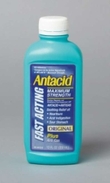Pronunciation
meye-LAN-tuh - Pronunciation guide
Brand Names
- Mylanta
Description
Mylanta is an antacid that works to neutralize stomach acid that has already been produced in the horse's stomach. With the advent of endoscopy, veterinarians have discovered that many horses have digestive system ulcers. These include race horses, competition horses, and pleasure horses not known to lead stressful lives.
Many veterinarians believe that modern-day feeding methods, which do not allow for lengthy periods of grazing, are responsible for many cases of ulcers. When the horse's stomach is empty between feedings, it is thought that the digestive acids being secreted damage the stomach, leading to ulcers.
While Mylanta may be useful for short-term relief of acid build-up, most veterinarians prescribe either H2 blocker medications, such as cimetidine, rantidine, or famotidine, or, more often, omeprazole, sold under the brand name, Gastrogard, which works by shutting down some of the stomach cells' ability to produce large quantities of hydrochloric acid. This gives an equine ulcer time to heal. In contrast, oral antacids, such as Mylanta, work to neutralize stomach acid that has already been produced and are only effective for short periods of time.
Usage
Although Mylanta is used for the treatment of ulcers in horses, other medications, including H2 blockers and omeprazole, are preferred because of the ability of these drugs to offer long-term effectiveness.
Dosage and Administration
| Mylanta | ||||
|---|---|---|---|---|
| Method | Dosage | Concentration | Period | Duration |
| Oral | 200-250 ml 1 | Mylanta Regular Strength | 3 to 6 times daily | Up to 2 weeks |
Notes:
|
||||
Side Effects
No side effects are mentioned in available literature
Precautions
Mylanta works on a short-time basis only and will not lead to healing of ulcers.
Interactions
None mentioned in literature
Overdose
No information noted.
Images
 Mylanta Liquid Antacid
Mylanta Liquid Antacid
Literature
